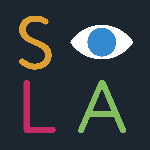Our first interview is with Francis Vallejo, winner of llustration West 55’s Joseph Morgan Henninger Best in Show as well as a Gold (Entertainment & Visual Development), Silver (Advertising) and Bronze Unpublished/Self-Promotional in Illustration West 47.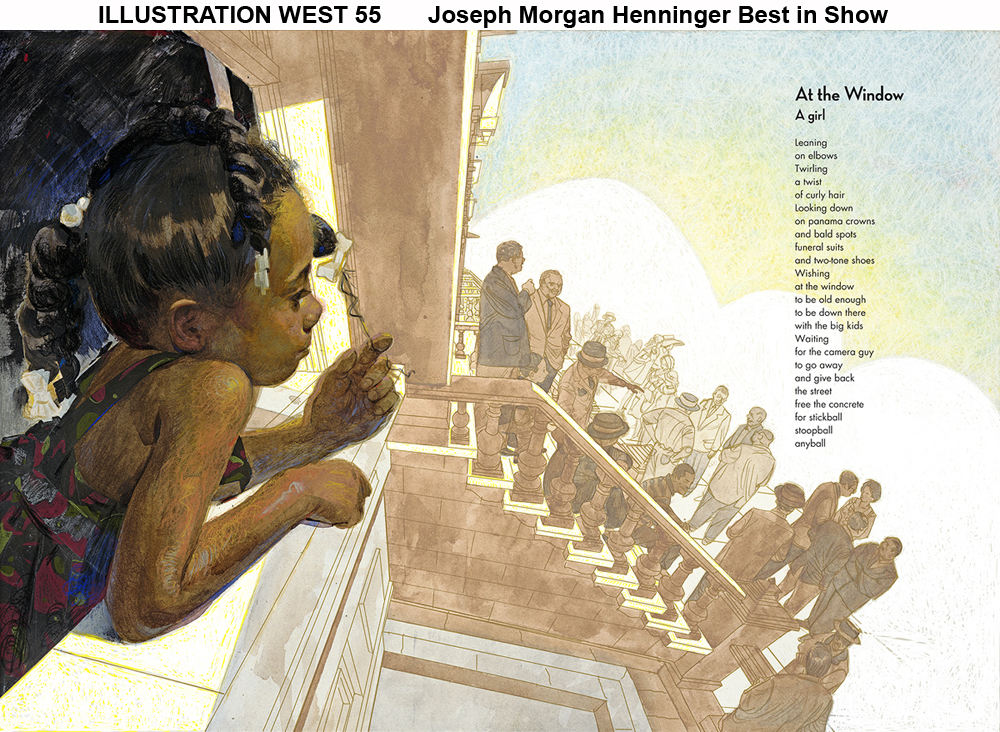
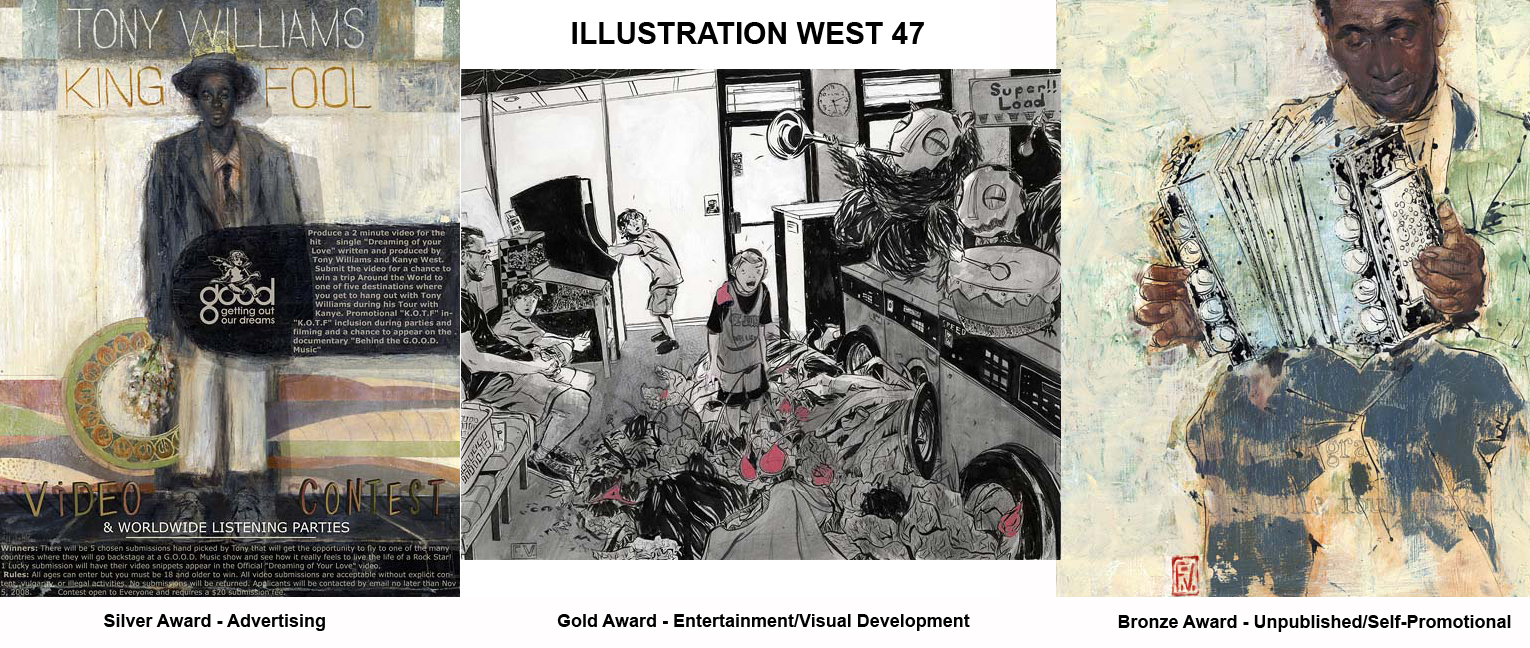
Board member David Habben, Web Chair, conducted the interview with Francis:
What excites you about illustration?
Drawing and composing. I’m an illustrator as a result of my comic book fandom as a young boy. I would pour over Todd McFarlane’s Spider-Man and Spawn drawings and go off and try to replicate his detailed linework. Ink is my favorite drawing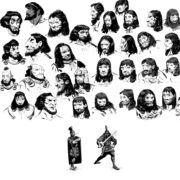 tool, and to this day I love to play with making new marks to describe forms. I love arranging the elements of pictures, and grouping the values, in unexpected ways. I initially became excited with composition by studying Norman Rockwell and Robert Fawcett, and have since added more avant garde artists like Bernie Fuchs, Robert Weaver, Ferenc Pinter, and Tadanori Yokoo to the influences.
tool, and to this day I love to play with making new marks to describe forms. I love arranging the elements of pictures, and grouping the values, in unexpected ways. I initially became excited with composition by studying Norman Rockwell and Robert Fawcett, and have since added more avant garde artists like Bernie Fuchs, Robert Weaver, Ferenc Pinter, and Tadanori Yokoo to the influences.
How did your hometown influence your artwork?
I’m an artist because of Bob’s Comics II on Groesbeck just north of Detroit. I would go every Tuesday once I got my license. I remember seeing my first George Pratt painted comic on those shelves and wondering what sort of comic is this? Painted!? George would later become my mentor in art college and beyond.
Detroiters are also very proud blue collar people. My father worked on the assembly line and instilled that grit into me when faced with a challenge. I certainly tried to bring that attitude to my early career as I was developing as an artist and entrepreneur.
What has been the most influential professional experience in your career so far?
My book “Jazz Day” (written By Roxane Orgill) has had the greatest impact. Before that project I sampled working in various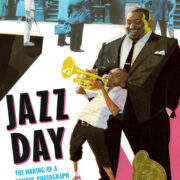 industries: editorial, exhibiting in galleries, storyboarding, comic interiors, etc. The Jazz Day project solidified publishing as the niche for me. The longer deadlines and abilities to play with designing a large body of work was thrilling. I was fortunate that the book did very well, and springboarded me into other publishing opportunities.
industries: editorial, exhibiting in galleries, storyboarding, comic interiors, etc. The Jazz Day project solidified publishing as the niche for me. The longer deadlines and abilities to play with designing a large body of work was thrilling. I was fortunate that the book did very well, and springboarded me into other publishing opportunities.
Where did you receive your training?
I received my BFA in Illustration (after changing majors from Computer Animation) from Ringling College of Art + Design. I then received my M.A. in Illustration a decade later from Savannah College of Art + Design. But the most influential and impactful program I attended was the two summers at The Illustration Academy headed by John English in ’08 and ’09.
What advice do you have for artists looking for formal training?
(1) Find a mentor that has the ability to guide you in developing your craft and (2) can articulate the various illustrative paths a fledgling artist can take and help you decide the path for you and (3) how to land a job(s) in your chosen field. After you’ve found this mentor or mentors, find a community of like minded creatives that you can develop alongside. For some this takes the form of attending a formal art school. These can be expensive and don’t guarantee they will contain the type of mentor you are looking for, so you need to do your homework as there are very good and very poor programs out there. For others this means pursuing a more independent route and attending an atelier and taking online courses. In the end, you do have to invest in yourself to some extent and take some risks since there is no perfect solution. Just find that mentor!!
How important are fundamental drawing skills in professional illustration?
Ideologically, I want to say it is very important. Drawing is communication and illustrators communicate and answer questions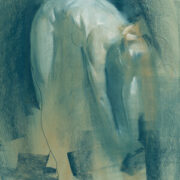 (while fine artists ask questions). With the proliferation of AI art and its guaranteed evolution, drawing’s emphasis might change a bit. I’m an illustrator specifically because it is an excuse to draw. It’s what I love to do. But in the end, it’s just a vehicle to communicate a concept or story, so perhaps tools may evolve where that concept or story can be communicated as effectively without drawing. It’s already happening, so it will be interesting to see how the new generations of illustrators answer this question. If there are new illustrators reading this and you love to draw, keep doing it. That is your truth and perhaps the very reason you chose illustration. I don’t think drawing is going to be obsolete, but it’s going to become more normal to have a successful career and not be able to do it. But there will always be a space for people with strong fundamental drawing skills.
(while fine artists ask questions). With the proliferation of AI art and its guaranteed evolution, drawing’s emphasis might change a bit. I’m an illustrator specifically because it is an excuse to draw. It’s what I love to do. But in the end, it’s just a vehicle to communicate a concept or story, so perhaps tools may evolve where that concept or story can be communicated as effectively without drawing. It’s already happening, so it will be interesting to see how the new generations of illustrators answer this question. If there are new illustrators reading this and you love to draw, keep doing it. That is your truth and perhaps the very reason you chose illustration. I don’t think drawing is going to be obsolete, but it’s going to become more normal to have a successful career and not be able to do it. But there will always be a space for people with strong fundamental drawing skills.
What forms of media inspires you most? Are there any that you avoid?
If this is referencing art mediums, I love so many of them. Most of my work in mixed media is inspired by the spirit that illustrators like Mark English brought to his pictures. With that said, the constant is ink with some form of subtle digital razzle dazzle. I’m not particularly interested in AR, VR, AI, 3D, or motion aka all the avenues the industry is moving into! I just want to make exciting marks on paper.
If this is referencing the other types of communication media, I am inspired by journalistic photography and music of all forms.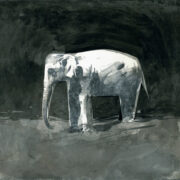 How beautiful is it that we can draw and jam out to music for a career!? I don’t watch too much TV or Movies, but have been getting back into books in a big way. My partner is an English teacher and book reading aficionado so she’s had a wonderful impact on that. Social media is a useful tool to promote oneself that is horrible for our well being. I try to pre-schedule large blocks of posts so they happen automatically and I can forget about them. I actually have a new block of posts ready to hit the social media platforms soon.
How beautiful is it that we can draw and jam out to music for a career!? I don’t watch too much TV or Movies, but have been getting back into books in a big way. My partner is an English teacher and book reading aficionado so she’s had a wonderful impact on that. Social media is a useful tool to promote oneself that is horrible for our well being. I try to pre-schedule large blocks of posts so they happen automatically and I can forget about them. I actually have a new block of posts ready to hit the social media platforms soon.
What other forms of artmaking do you enjoy?
Printmaking (of all forms) is a phenomenal process and I hope to do much more of it. I am planning on investing in a substantial press for my studio. Sculpture and ceramics have also been a blast in the limited time I have spent playing with them.
Do you have any recommendations for an illustrator interested in teaching?
First of all, do it. It forces you to go inwards and articulate that which you do naturally. The art community is a wonderful place and has 1,000s of years of tradition and people paying forward the lessons they have learned. It’s a privilege to be part of that legacy and share your ideas. Be yourself and emphasize your strengths and truths. You probably didn’t pursue illustration because of its stuffy and formal reputation. No! It was probably because it was fun and playful and exciting. I say bring that playful attitude to the classroom. Part of our job as teachers (I’ve been a full time instructor at The College for Creative Studies for the past 7 years) is to encourage young illustrators to be themselves and find their truth. That starts with you, so show those students how you can bring your individual personality into your lessons!
All artwork ©2022 Francis Vallejo, not for re-use without permission of the artist.
